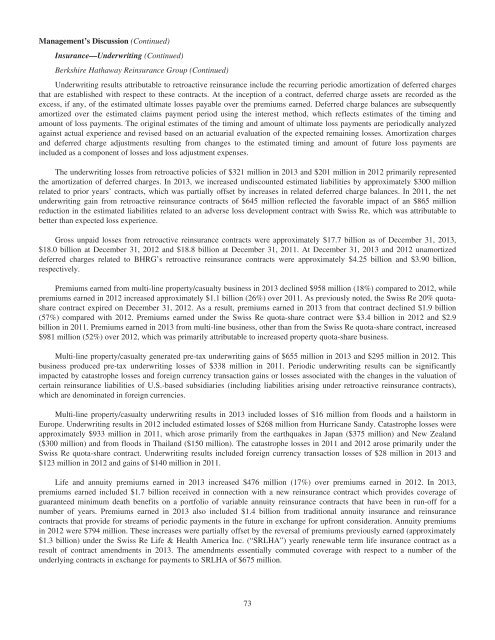u8Zcc
u8Zcc
u8Zcc
Create successful ePaper yourself
Turn your PDF publications into a flip-book with our unique Google optimized e-Paper software.
Management’s Discussion (Continued)<br />
Insurance—Underwriting (Continued)<br />
Berkshire Hathaway Reinsurance Group (Continued)<br />
Underwriting results attributable to retroactive reinsurance include the recurring periodic amortization of deferred charges<br />
that are established with respect to these contracts. At the inception of a contract, deferred charge assets are recorded as the<br />
excess, if any, of the estimated ultimate losses payable over the premiums earned. Deferred charge balances are subsequently<br />
amortized over the estimated claims payment period using the interest method, which reflects estimates of the timing and<br />
amount of loss payments. The original estimates of the timing and amount of ultimate loss payments are periodically analyzed<br />
against actual experience and revised based on an actuarial evaluation of the expected remaining losses. Amortization charges<br />
and deferred charge adjustments resulting from changes to the estimated timing and amount of future loss payments are<br />
included as a component of losses and loss adjustment expenses.<br />
The underwriting losses from retroactive policies of $321 million in 2013 and $201 million in 2012 primarily represented<br />
the amortization of deferred charges. In 2013, we increased undiscounted estimated liabilities by approximately $300 million<br />
related to prior years’ contracts, which was partially offset by increases in related deferred charge balances. In 2011, the net<br />
underwriting gain from retroactive reinsurance contracts of $645 million reflected the favorable impact of an $865 million<br />
reduction in the estimated liabilities related to an adverse loss development contract with Swiss Re, which was attributable to<br />
better than expected loss experience.<br />
Gross unpaid losses from retroactive reinsurance contracts were approximately $17.7 billion as of December 31, 2013,<br />
$18.0 billion at December 31, 2012 and $18.8 billion at December 31, 2011. At December 31, 2013 and 2012 unamortized<br />
deferred charges related to BHRG’s retroactive reinsurance contracts were approximately $4.25 billion and $3.90 billion,<br />
respectively.<br />
Premiums earned from multi-line property/casualty business in 2013 declined $958 million (18%) compared to 2012, while<br />
premiums earned in 2012 increased approximately $1.1 billion (26%) over 2011. As previously noted, the Swiss Re 20% quotashare<br />
contract expired on December 31, 2012. As a result, premiums earned in 2013 from that contract declined $1.9 billion<br />
(57%) compared with 2012. Premiums earned under the Swiss Re quota-share contract were $3.4 billion in 2012 and $2.9<br />
billion in 2011. Premiums earned in 2013 from multi-line business, other than from the Swiss Re quota-share contract, increased<br />
$981 million (52%) over 2012, which was primarily attributable to increased property quota-share business.<br />
Multi-line property/casualty generated pre-tax underwriting gains of $655 million in 2013 and $295 million in 2012. This<br />
business produced pre-tax underwriting losses of $338 million in 2011. Periodic underwriting results can be significantly<br />
impacted by catastrophe losses and foreign currency transaction gains or losses associated with the changes in the valuation of<br />
certain reinsurance liabilities of U.S.-based subsidiaries (including liabilities arising under retroactive reinsurance contracts),<br />
which are denominated in foreign currencies.<br />
Multi-line property/casualty underwriting results in 2013 included losses of $16 million from floods and a hailstorm in<br />
Europe. Underwriting results in 2012 included estimated losses of $268 million from Hurricane Sandy. Catastrophe losses were<br />
approximately $933 million in 2011, which arose primarily from the earthquakes in Japan ($375 million) and New Zealand<br />
($300 million) and from floods in Thailand ($150 million). The catastrophe losses in 2011 and 2012 arose primarily under the<br />
Swiss Re quota-share contract. Underwriting results included foreign currency transaction losses of $28 million in 2013 and<br />
$123 million in 2012 and gains of $140 million in 2011.<br />
Life and annuity premiums earned in 2013 increased $476 million (17%) over premiums earned in 2012. In 2013,<br />
premiums earned included $1.7 billion received in connection with a new reinsurance contract which provides coverage of<br />
guaranteed minimum death benefits on a portfolio of variable annuity reinsurance contracts that have been in run-off for a<br />
number of years. Premiums earned in 2013 also included $1.4 billion from traditional annuity insurance and reinsurance<br />
contracts that provide for streams of periodic payments in the future in exchange for upfront consideration. Annuity premiums<br />
in 2012 were $794 million. These increases were partially offset by the reversal of premiums previously earned (approximately<br />
$1.3 billion) under the Swiss Re Life & Health America Inc. (“SRLHA”) yearly renewable term life insurance contract as a<br />
result of contract amendments in 2013. The amendments essentially commuted coverage with respect to a number of the<br />
underlying contracts in exchange for payments to SRLHA of $675 million.<br />
73


